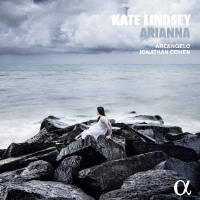Texte paru dans: / Appeared in: |
|
|
Appréciation d'ensemble / Overall evaluation :
|
|
|
Reviewer: Berta
Joncus Ardent, brilliant, stately: mezzo-soprano Kate Lindsey probes the inner states of the mythical Cretan princess Ariadne. Abandoned by Theseus after helping him escape the Minotaur, Ariadne loves in extremis. Lindsey’s ravishing performances of cantatas by Alessandro Scarlatti, Handel and Haydn immerse us in her joys and suffering.
The Ariadne of each cantata is very different. Scarlatti's heroine is almost embarrassingly intimate: she caresses her beloved, rejoices in her projected marriage, then erupts as she realises she has been betrayed. By the end of this emotional journey, Lindsey's pure, straight tone has become a jagged, vibrato-pocked whisper. Handel, by contrast, deploys suave vocalism - sustained pitches, artful dissonances, hushed cadences – to make Ariadne’s agony beautiful. Lindsey subtly shapes her main motifs in response and unleashes a rainbow of colours. Handel's hope-filled final movement binds solo oboe to soprano voice, their leather-light arabesques clinching a benchmark performance of HWV 78. The project closes with Haydn’s Enlightenment cantata: the band doubles in size, a clarinet duets with Ariadne, and arioso recitative does the affective heavy lifting. Lindsey adds muscle to her lofty and dignified arias by bounding up to top notes and thickening her middle register as she broods. Director Jonathan Cohen adds hugely to these performances, in the Haydn especially. Cohen takes risks with his tempos and dynamics, and by allowing the instrumentalists he sometimes push Lindsey aside; these pay off in many striking moments, for instance when Haydn's heroine overtakes the band to sprint to her final cadence. Forget victimhood - here, Ariadne wins.
| |
|
|
|
|
|
|
|
Cliquez l'un ou l'autre
bouton pour découvrir bien d'autres critiques de CD |
|




